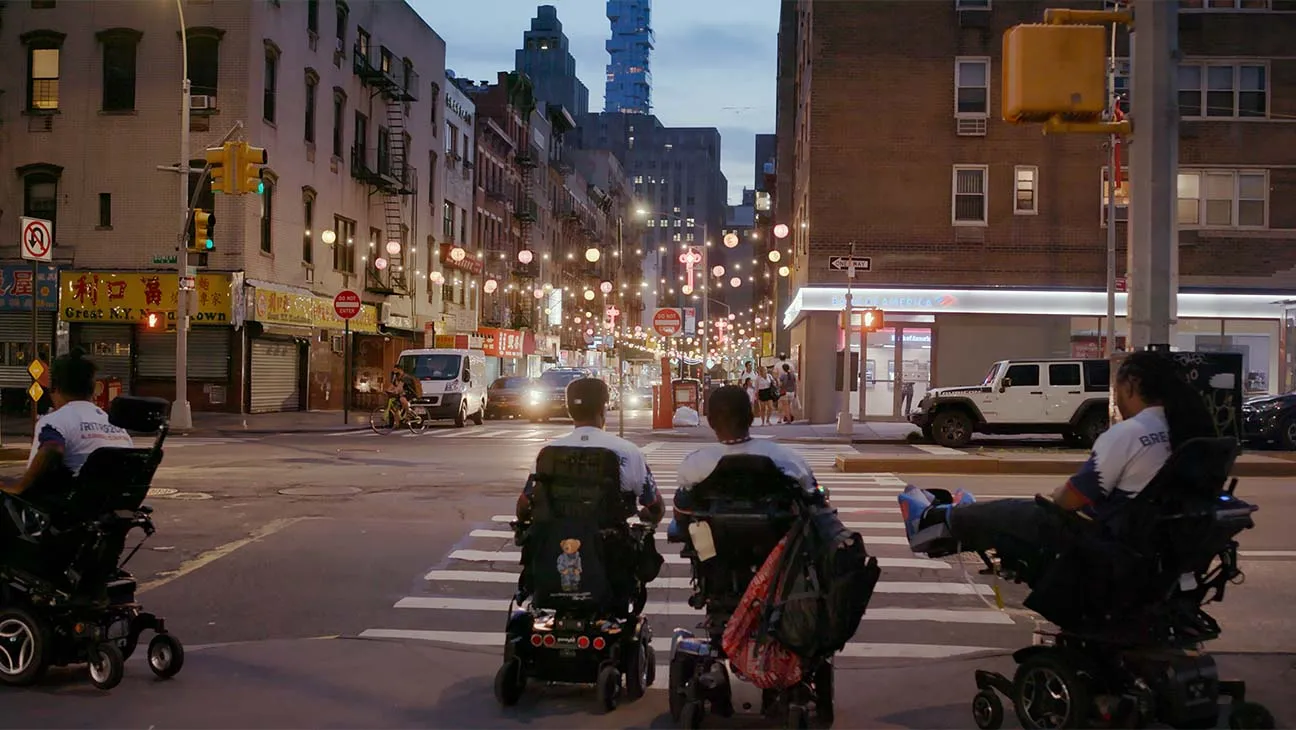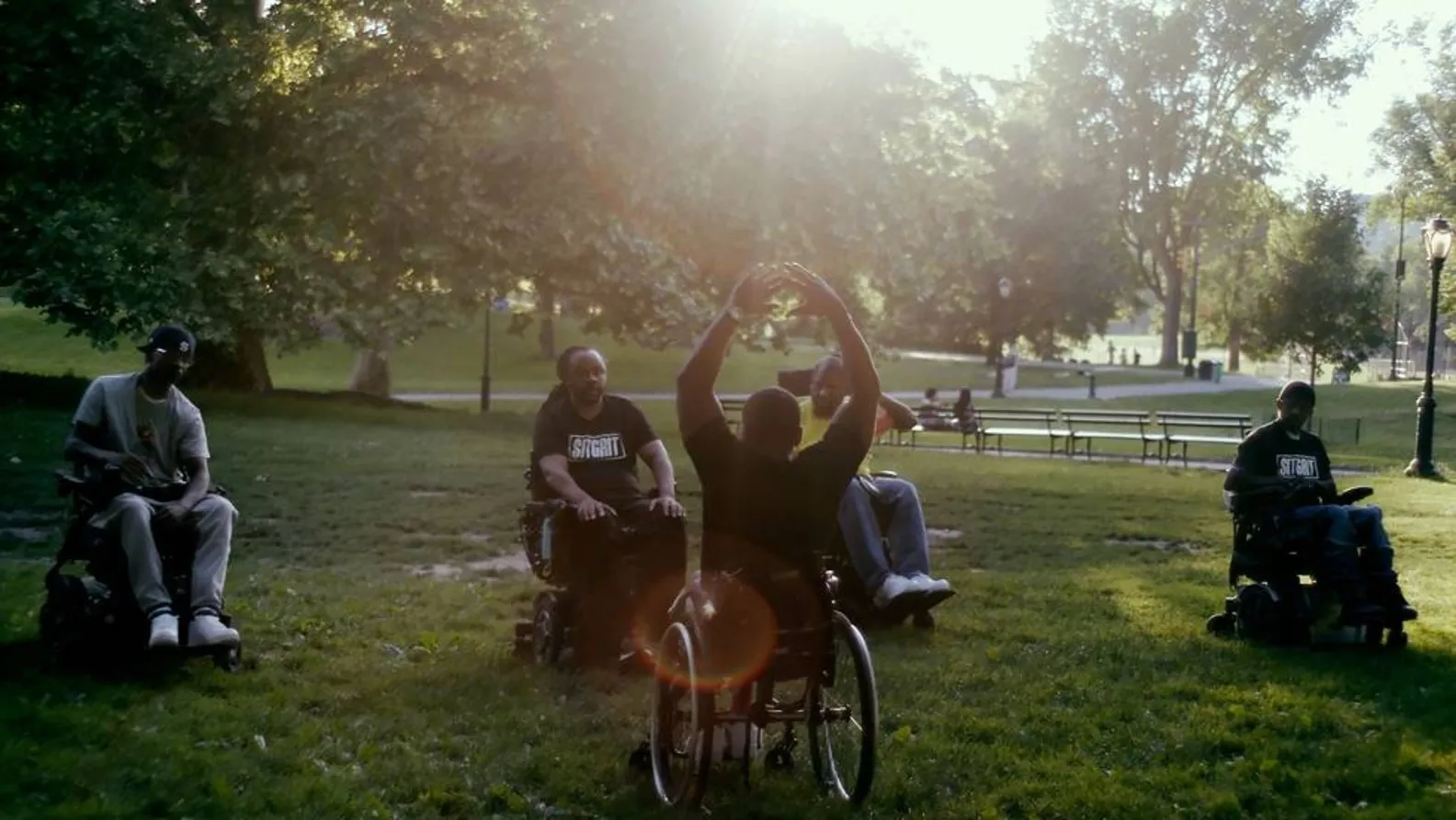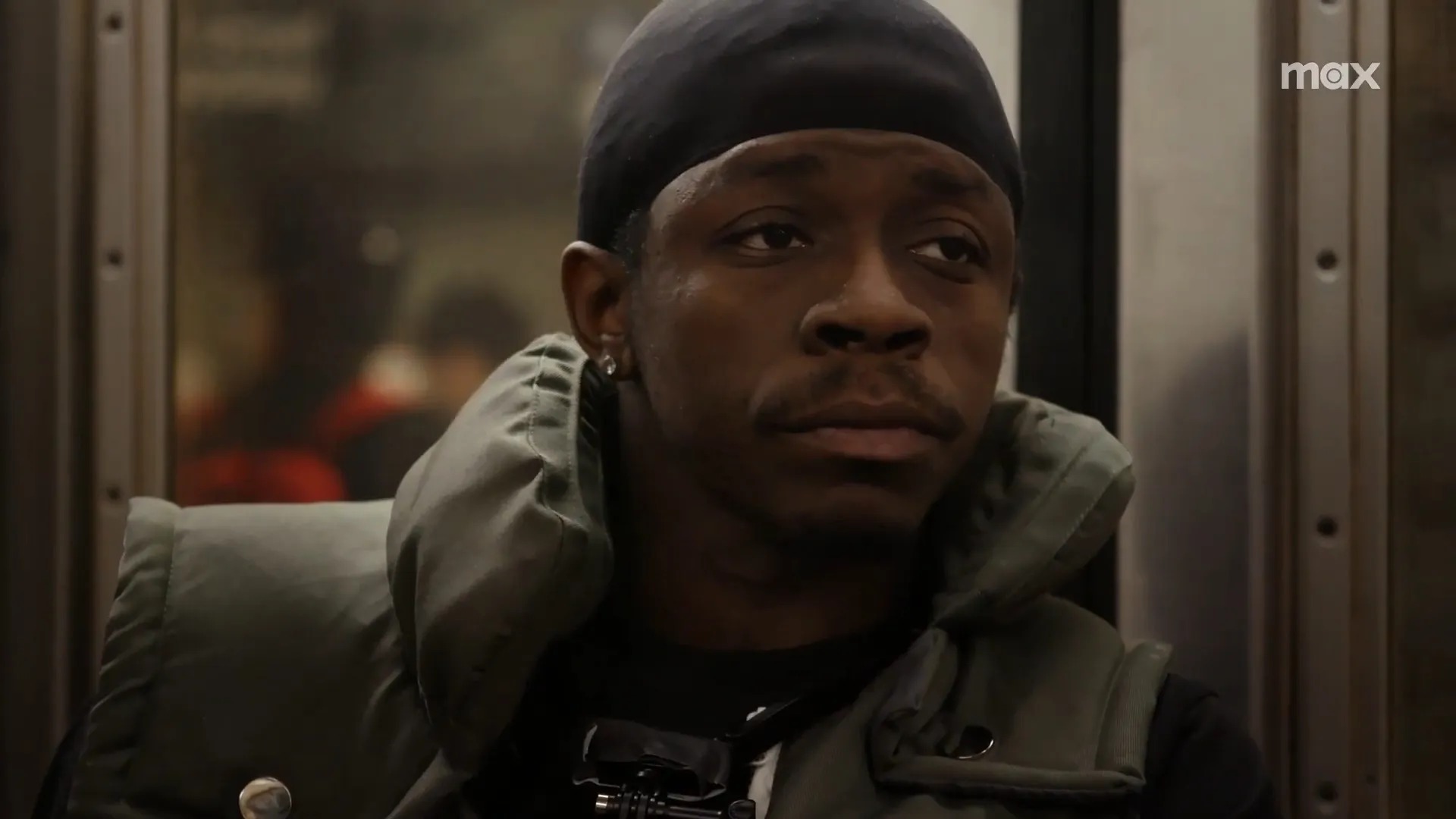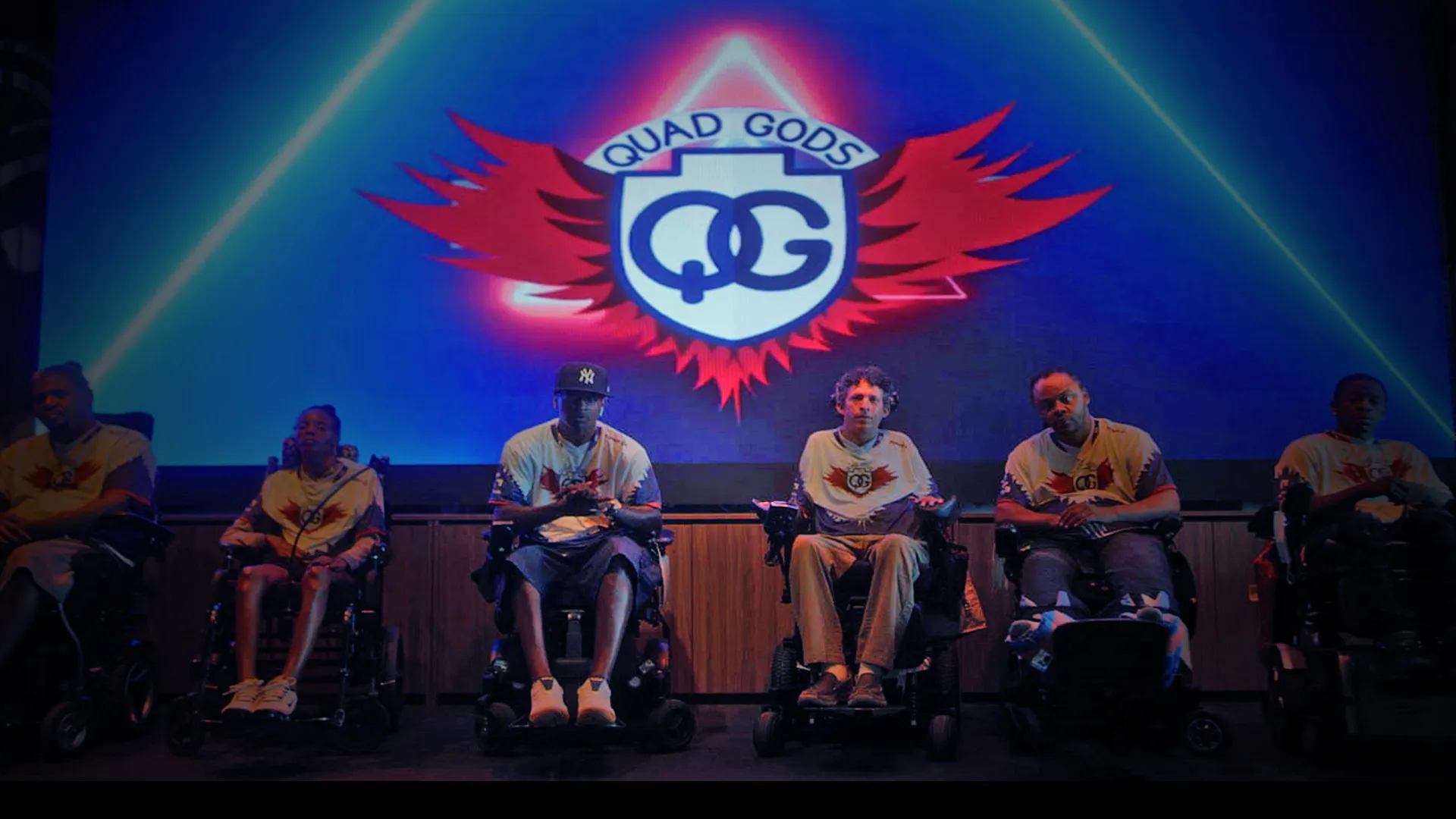We meet Richard, Blake, and Prentice, the founders of history’s first all-quadriplegic esports team. After spinal injuries left them without the use of their legs, these men found purpose and passion through competitive video gaming.
Rather than follow the usual sports documentary playbook of building towards a climactic tournament, director Jess Jacklin crafts intimate character studies. Her camera brings us into the everyday worlds of each man, giving a glimpse of not just their limits but also their vibrant lives full of hope, humor, and heart.
We learn of their lives before disability and witness the creativity with which they continue pursuing goals both modest and monumental in the face of immense challenges.
Along the way, Jacklin poses thoughtful questions about how society views those with disabilities and what it means to find fulfillment on one’s own terms. Now let’s join these pioneers on their journey.
Meet the Quad Gods
At the heart of Quad Gods we meet Richard, Blake, and Prentice—gamers and former athletes all living with quadriplegia. Though their injuries limit much of their bodies, their spirits and dreams remain boundless. And through competitive gaming, they’ve found both rehab and a community.
Richard, known as “Breadwinner1007” online, is the leader of the Quad Gods. Fiery competitive, he pours his energy into strategy. Once a basketball star, his life took a sudden turn when he was shot during an attempted robbery. Now a father raising his daughter alone, video games offer Richard an outlet and way to support his family.
Then there’s Blake, going by “Repnproof.” Always quick with a smile, he lights up any room. A former football player, Blake now works as an Uber Eats driver, zipping his electric wheelchair through the busy NYC streets. Where others see limitations, Blake seems to revel in the present.
Prentice, or “Mongoslade,” had his dreams on the gridiron shattered in a motorcycle crash. Searching now to walk again, he undergoes testing for experimental technology. Yet through it all, Prentice maintains hope, looking both to the future and finding joy today amongst teammates.
Beyond our main trio, we meet others on the fringes of the Quad Gods—friends, family, even those no longer with us. Their inclusion enriches the story. And we learn too of the innovations in rehab through Dr. Putrino, who sees in gaming a pathway to rebuild lives.
What’s striking is how deeply Jacklin develops characters many would reduce to disabilities alone. Their feelings, relationships, and drives emerge with nuance—complex humans living full lives that defy expectations. In them, we witness resilience, optimism, and humanity’s endless capacity to adapt—finding purpose even in life’s harshest of turns.
Finding Their Own Path
At its core, Quad Gods chronicles the formation of the world’s first eSports team composed solely of quadriplegic gamers. Bringing the adaptive gaming community together was Dr. Putrino, who saw competitive play as an avenue for both therapy and empowerment. His introduction of Richard, Blake, and Prentice sets the stage for their participation in an upcoming tournament.
Yet director Jacklin eschews a traditional sports documentary structure. Rather than following a tried narrative of ensuring the team achieves victory, she peels back layers of her subjects’ lives. Through immersed scenes simply observing their day-to-day—whether navigating the accessibility of New York streets or the minutiae of relationships—we come to know these men as dynamic individuals. Their disabilities are not what defines them.
By abandoning expectations of a climactic sports finale, the documentary at times feels directionless. Some may question why it does not focus more closely on the team’s competitive pursuit and preparation. However, Jacklin’s approach deepens our understanding of her subjects beyond expectations. We witness private moments that highlight resilience as well as intimacy, from Richard’s tears in a racecar to Blake’s romantic date.
Yet not all threads are fully explored. Prentice’s medical journey could benefit from more screentime to illuminate hopes for walking. And while the animation brings the virtual world to life, its purpose within the narrative is occasionally unclear.
Overall, in abandoning a formulaic structure, the film allows characters to shape their own path. By immersing us in their lives rather than emphasizing a conclusion, Jacklin presents disability without diminishing humanity, reminding us that true victory lies not in any single achievement but in living fully as our true selves.
Capturing Humanity in Motion
Jess Jacklin’s directorial approach brings us deeply into the lives of her subjects without uttering a single narrated word. Her observational style lets real moments unfold, whether triumphant or intensely personal. We see the Quad Gods not as icons but as dynamic individuals.
Blake’s role in delivering food reveals the difficulties of an inaccessible city. Yet his indomitable spirit transforms even police assistance into an upbeat street joyride. Richard’s turn behind the wheel stirs complex emotion, recognition that closed doors can reopen. Their bond emerges through presence with one another, not forced team-building.
Simple scenes speak volumes. During gaming, frustrated gestures between Richard and Blake expose nuanced relationships within their shared pursuit. As when we observe friends through everyday exchanges unshaped by outside parties.
Cinematography breaks expectations of limited motion. Wheels spinning or figures lounging carry as much energy as any footage of able bodies. Behind-chair rides fill frames with lively streets that fully include wheeled travelers. An animated sequence visualizes virtual prowess, though live actions prove superfluous flourishes are unnecessary to portraying real strength.
Curiosity, not explanation, drives discoveries at medical facilities. Imagining alternate capacities uplifts without cheapening present realities. Focus remains on individuals navigating barriers, reinventing lives that ableism deems finished.
Through immersive filming transferring us into subjects’ points of view, Jacklin affirms their humanity beyond disability. Quad Gods moves by humanity in motion.
Passionate Perspectives
This film shares powerful themes. The Quad Gods find purpose through competitive gaming, supporting each other as a community. Their skills go far beyond simply playing; it’s about believing in yourself when others don’t.
Jacklin looks past expectations around disability. Yes, mobility is limited, but minds and spirits prevail. Through her lens, we see dedication, humor, and love—all things making lives rich. She normalizes their uniqueness instead of isolating disability.
Accessibility presents daily challenges, from city streets to dating. But barriers exist in attitudes too. The guys are facing what some see as limitations yet live without limits. Their options widen through adaptive technology and open environments.
Each optimizes what they have, proving “can’t” is not final. Their experiences show resilience born of overcoming trauma. But more than bounce-back, it’s optimization—continuously leveling up skills and expanding what’s possible.
Gaming fuels this evolution, strengthening mind-body connections. It’s therapeutic, connecting them to purpose and each other. We watch their bonds form through shared passion, supporting dreams unlikely to outsiders.
In following lives seldom seen, Jacklin expands our thinking. She captures humanity above all—the universal desires of all people to find community and show the world what they can achieve against the odds. The Quad Gods remind us that ability takes many forms, and where one sees limits, others see only frontiers.
Fulfilling Futures
This film shares a story near to heart. Jacklin crafts rich characters bursting with spirit beyond limits perceived. Through her lens, disability defines not ability but society’s failure to accommodate all people.
The Quad Gods refuse simple roles. As vibrant individuals, their bond stems not from shared challenges but shared passions. Competing together finds each man purpose, yet winning holds mixed priority. By splitting assumptions of monolithicy, a fuller humanity shines through—humble, hopeful, and determined to live fully, not simply survive.
Representation like this impacts deeply. Rarely do those with disabilities receive such care in both struggles depicted and humanity celebrated. Jacklin sees her subjects as whole, enabling others that glimpse of equality. She normalizes seeking meaning through diverse paths, not pressuring any road but that of the heart’s desire.
Lasting too is empathy sparked for barriers imposed, not just bodily but in attitude. The guys navigating streets and systems not built with all in mind reminds the abled of duty to establish true community, where each part strengthens the whole through diverse contributions. Though challenges may differ, we all wish to belong and become our best selves.
This film fulfills a vision beyond tropes that isolate or lionize. With a vivid spirit and unvarnished look at living, it kindles optimism of endless potential within all people. Through accessibility and support, what seems limits can shrink into merely things not tried. Jacklin’s advocacy inspires expanding what society deems possible to realize a future where all talents find a stage to shine.
Celebrating Community
This documentary offers a moving look at a group of people who refuse to let limits define them. Through Jacklin’s skilled lens, we come to know Richard, Blake, and Pearson as dynamic individuals, not just diagnoses. While their circumstances differ, a shared passion for gaming brings them together in inspired ways.
Quad Gods subverts expectations at every turn. Rather than pursue feel-good arcs, it presents unvarnished truths—the frustrations of limited accessibility, struggles with pain, and purpose. Yet what resonates is the men’s zeal for life despite its hardships. Their communities, from the Quad Gods to supportive loved ones, become sources of strength.
Jacklin’s nuanced portraits shine a light too on a community too often overlooked. She captures big moments, like rediscovering driving, but finds deeper meaning in small acts of camaraderie. By peering inside lives seldom seen on screen, perspectives shift—these men emerge as whole people, deserving the same chances at joy, purpose, and belonging as anyone.
Importantly, the film inspires without sugarcoating reality’s harshness. It advocates simply by presenting its subjects’ full, compelling humanity. Through their example, one sees what people can achieve when surrounded by compassion rather than limits alone.
This poignant work will surely continue opening minds to the countless talents in us all, whatever outward form they come in. Its subjects have much to teach about traversing life’s obstacles with grit, humor, and heart—lessons to the benefit of anyone willing to learn.
The Review
Quad Gods
With deep empathy and observational skill, Jess Jacklin brings us an impactful glimpse into lives too often marginalized. Quad Gods is an unsentimental but inspiring portrayal of community, passion, and the human ability to transcend perceived limitations. Though realism precludes facile optimism, this documentary is a stirring reminder that our shared qualities of spirit far outweigh surface differences.
PROS
- Complex, multidimensional characters
- Avoidance of formulaic arcs or simplistic messages
- Striking visual storytelling and use of animation
- Focus on representation and advocacy through portraiture
- An inspiring depiction of community support and purpose
CONS
- Narrative occasionally lacks focus by covering many topics.
- Could have delved deeper into individual subjects' lives.
- Limited coverage of competitive esports elements






















































Discussion about this post